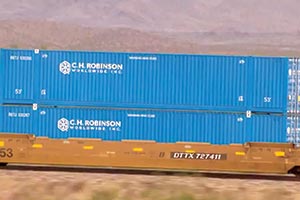Quarterly Profits Decline for 3PLs as Competition Puts Pressure on Rates

This story appears in the May 1 print edition of Transport Topics.
Third-party logistics providers reported profits that either fell or vanished in the first quarter even though revenue was on the rise, the companies said.
Some of the most prominent names in the industry, including C.H. Robinson Worldwide and Ryder System Inc., experienced problems but remained profitable. Echo Global Logistics was an exception, posting a net loss of almost $3 million.
Hub Group posted net income of $10.3 million, or 31 cents a share, on revenue of $893.4 million. That compares with $18 million, or 51 cents, in the same quarter a year ago on revenue of $805.6 million.
“We are experiencing a soft pricing environment due primarily to excess truck capacity and extraordinarily aggressive intermodal pricing, particularly in the West. At the same time, our rail transportation costs continue to increase, further compressing earnings,” Hub said in its April 26 earnings statement.
Hub ranks No. 28 on the Transport Topics Top 50 list of logistics companies. Hub provides intermodal, trucking and brokerage services.
Hub’s transportation costs rose to $791.9 million from $697.5 million in the year-ago quarter. That pushed down net revenue (gross revenue less the cost of purchased transportation) to $101.6 million in the recent quarter from $108.4 million.
For C.H. Robinson, North America’s largest freight broker, because of a fall in income taxes net income rose 2.6% to $122.1 million, or 86 cents. Revenue increased by 11.1% to $3.42 billion.
It earned $119 million, or 83 cents, on sales of $3.07 billion in the same period the year before.
C.H. Robinson ranks No. 5 on the Transport Topics Top 50 list of the largest logistics companies in North America.
Operating income declined 5.5%, and net revenue inched up 0.9% to $568.6 million. And the provision for income taxes fell 20.6% to $56.6 million from $71.2 million. The Robinson statement attributed the fall to its adoption of an accounting standards update on stock compensation. The update was published by the Financial Accounting Standards Board in March 2016.
Ryder said April 25 that its profits fell 32% to $38.1 million, or 71 cents, reflecting a drop in demand to rent trucks and an overall weak used-truck sales market has continued. After adding back pension costs and a tax adjustment, the earnings-per-share total was raised to 82 cents. That compares with year-ago results of $55.8 million or $1.04.
Revenue increased 7.2% to $1.75 billion as strong results in fuel and service boosted top-line results, making up for the flat performance from lease and rental business. However, expenses went up 8.7% with a significant increase in fuel costs and an $18.3 million reduction in used vehicle sales.
Ryder ranks No. 7 on the TT logistics 50.
The company’s main businesses are full-service truck leasing, dedicated carriage and logistics management.
Echo reported record revenue for a first quarter April 26, despite a loss of $2.87 million, or 10 cents, as purchased transportation costs increased. That compares with $262,600, or 1 cent, the year before. Revenue was $415.8 million for the period ended March 31, compared with $405.3 million.
Quarterly brokerage revenue was nearly flat, gaining just 0.3% year-over-year to $333 million, but the managed transportation segment grew by 13% to $82.8 million from $73.3 million.
The margin of net revenue deteriorated by 2 percentage points to 17.9% in the quarter just ended from 19.9%.
Echo ranks No. 39 on the TT logistics 50.




